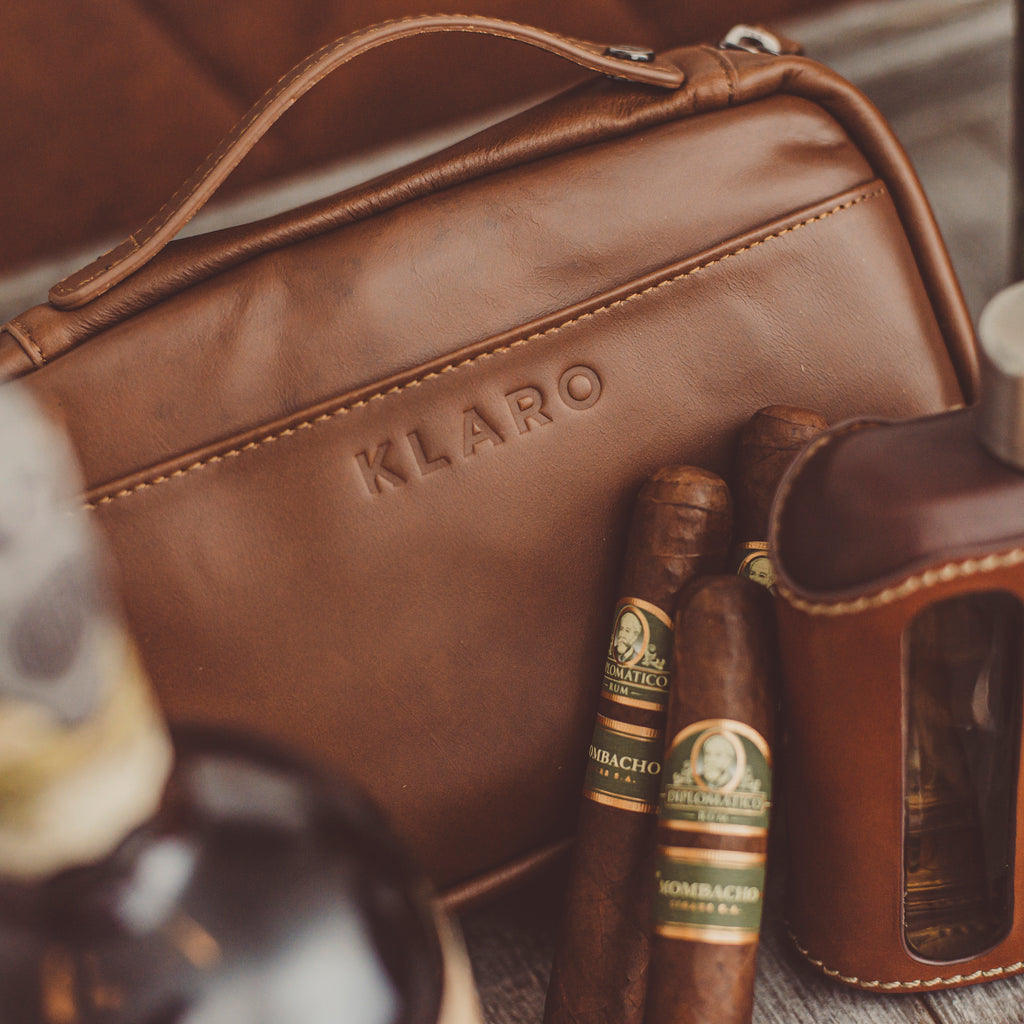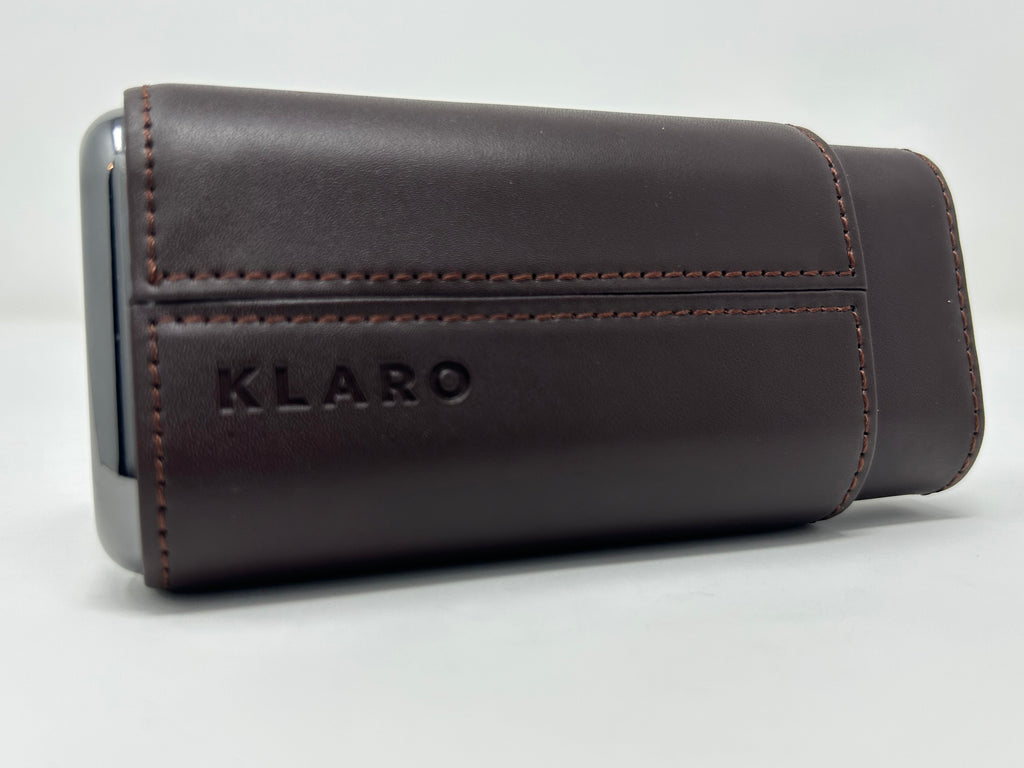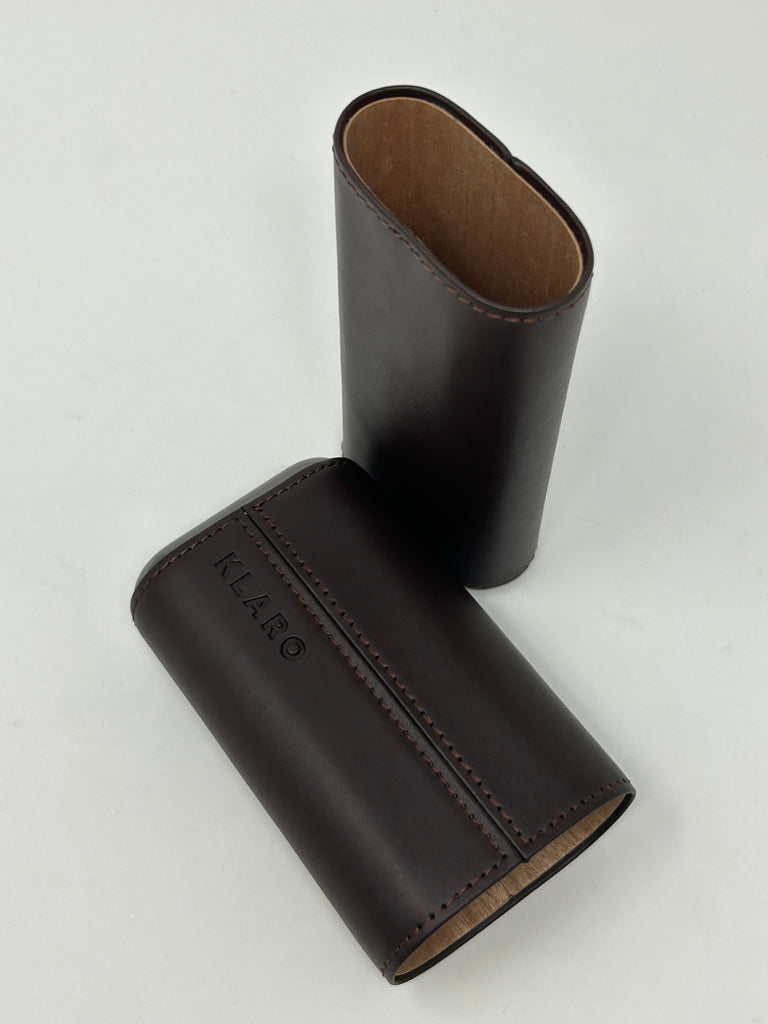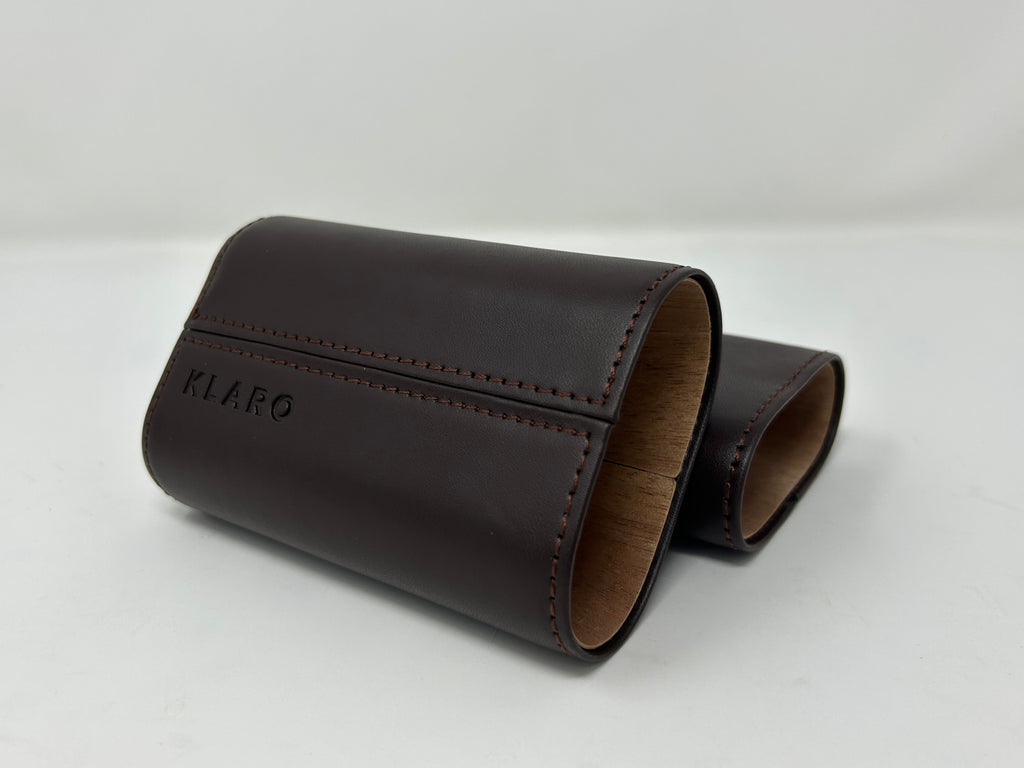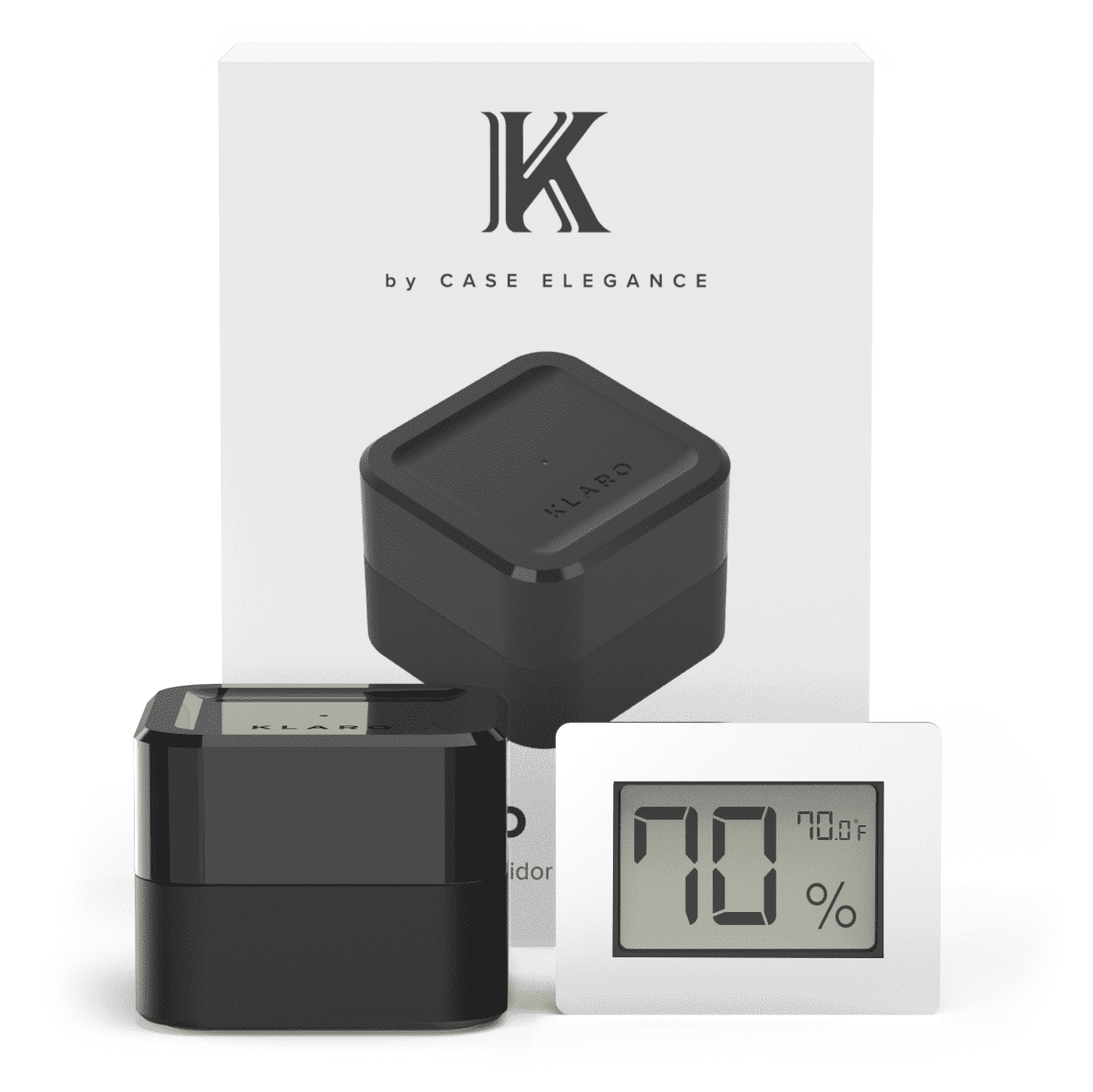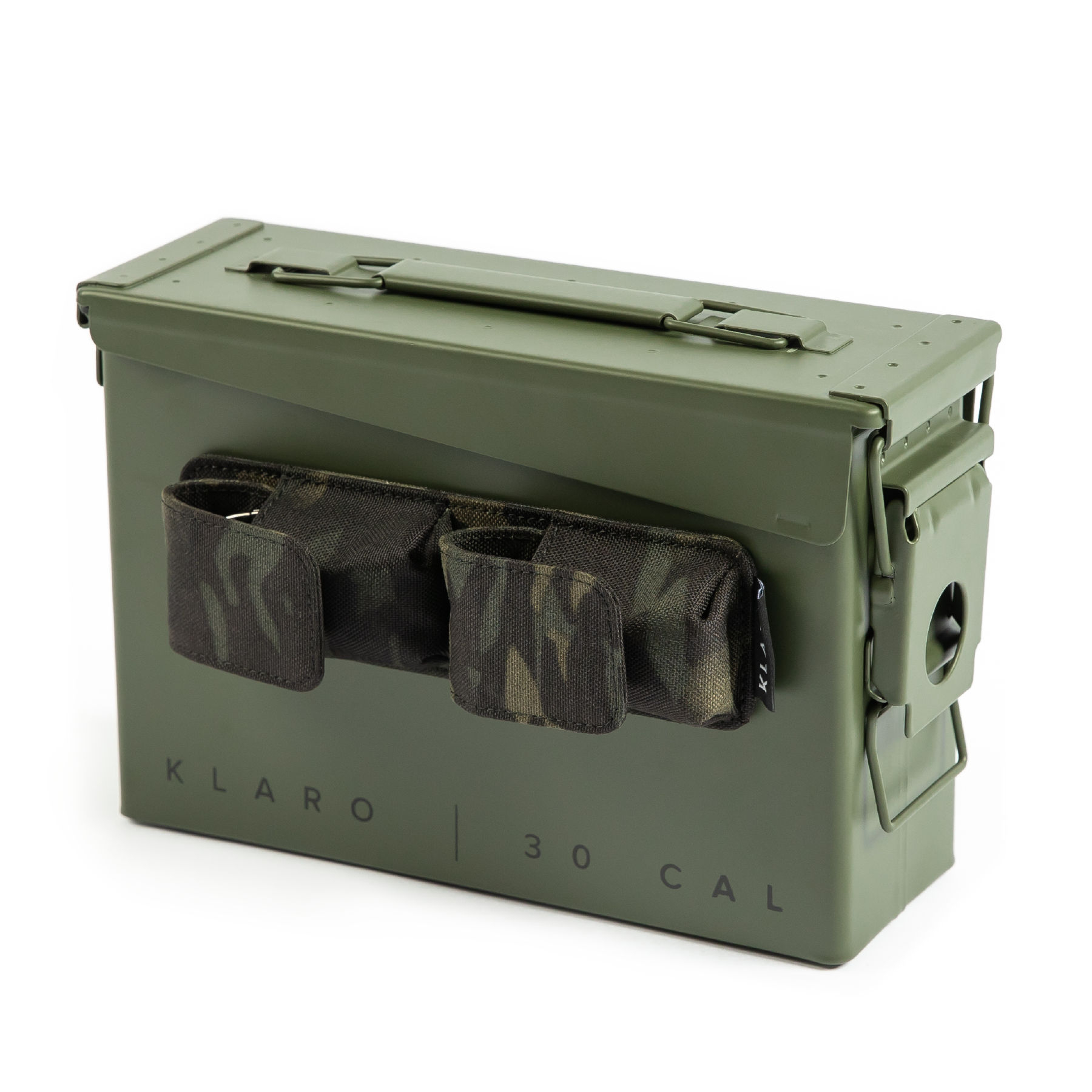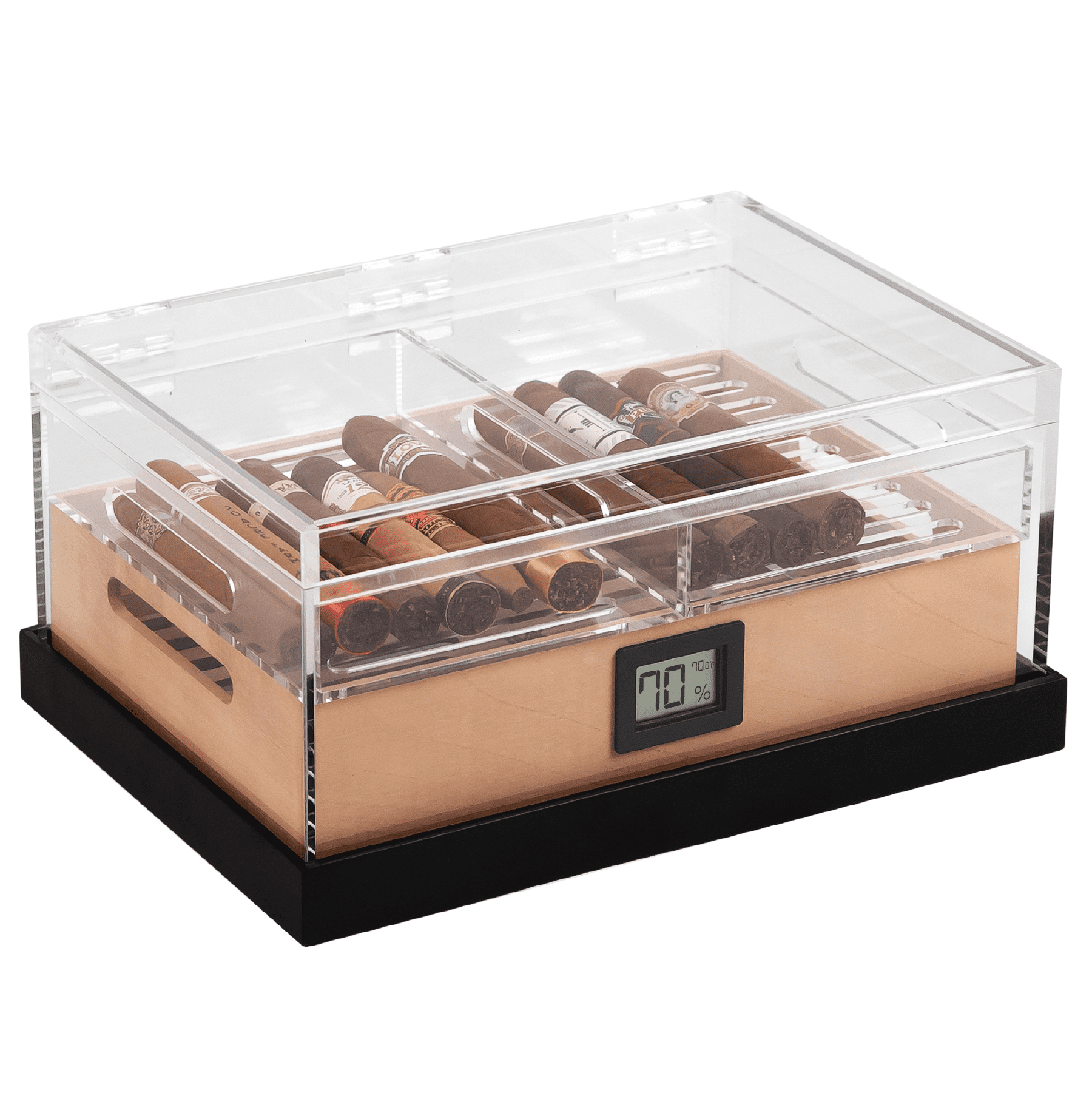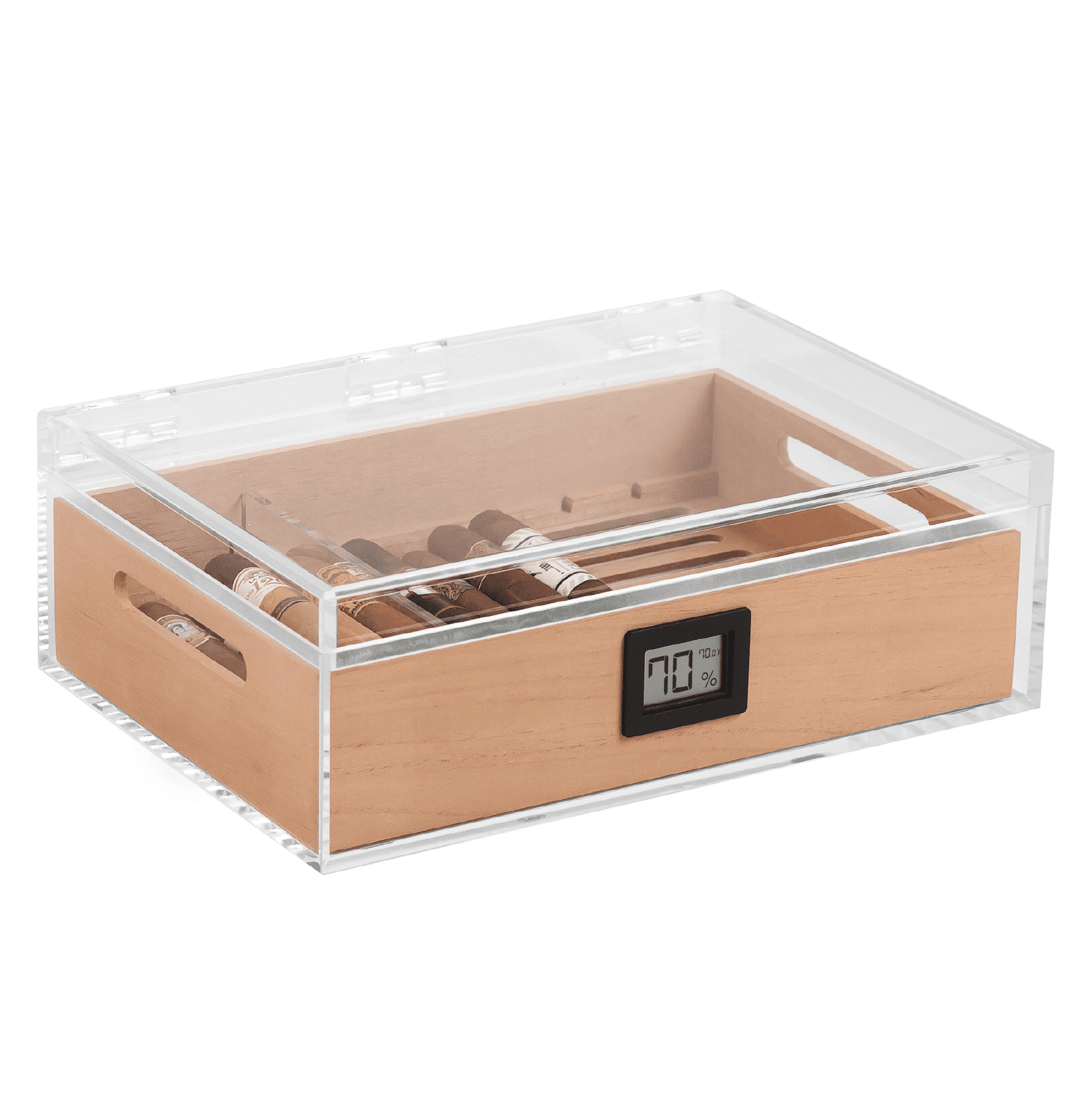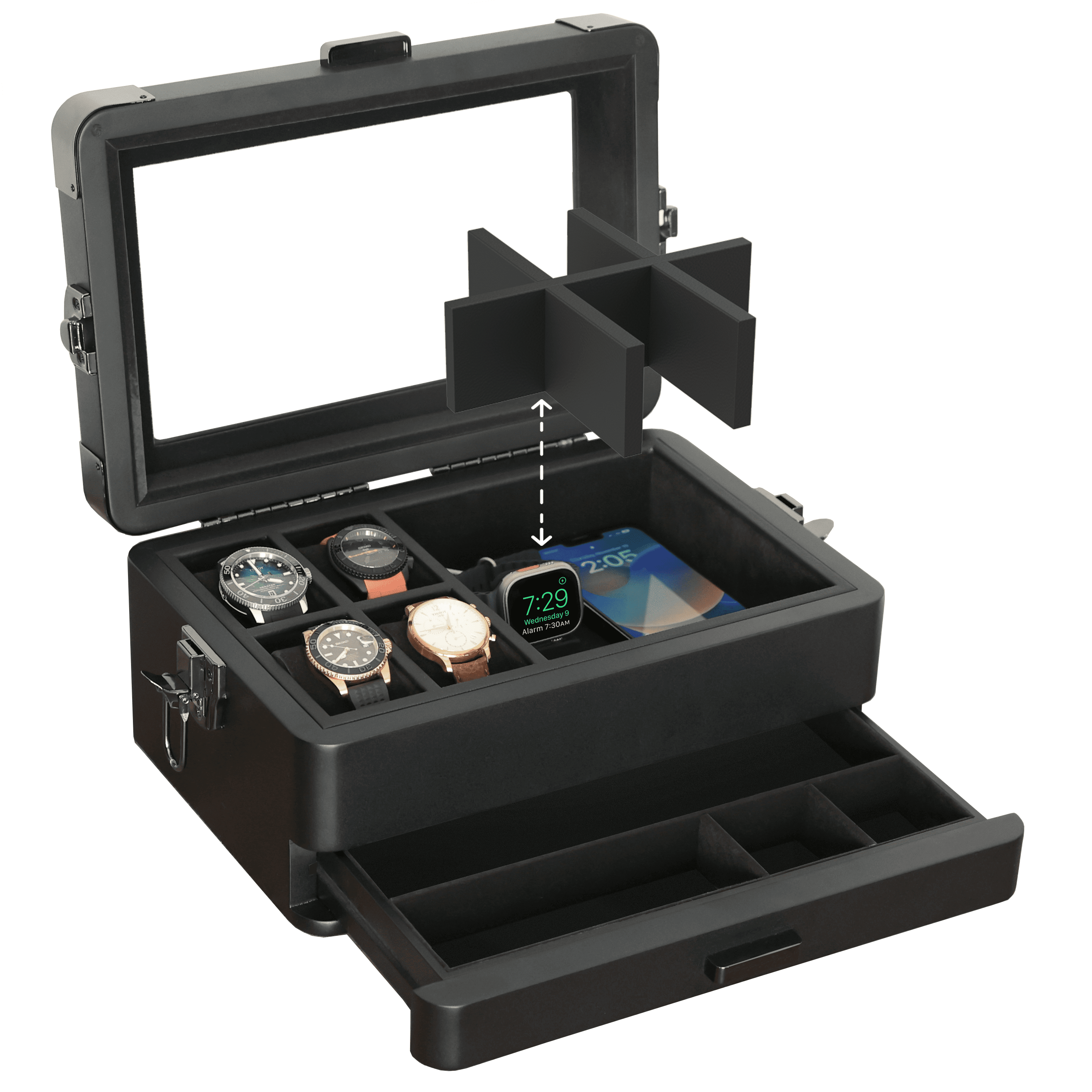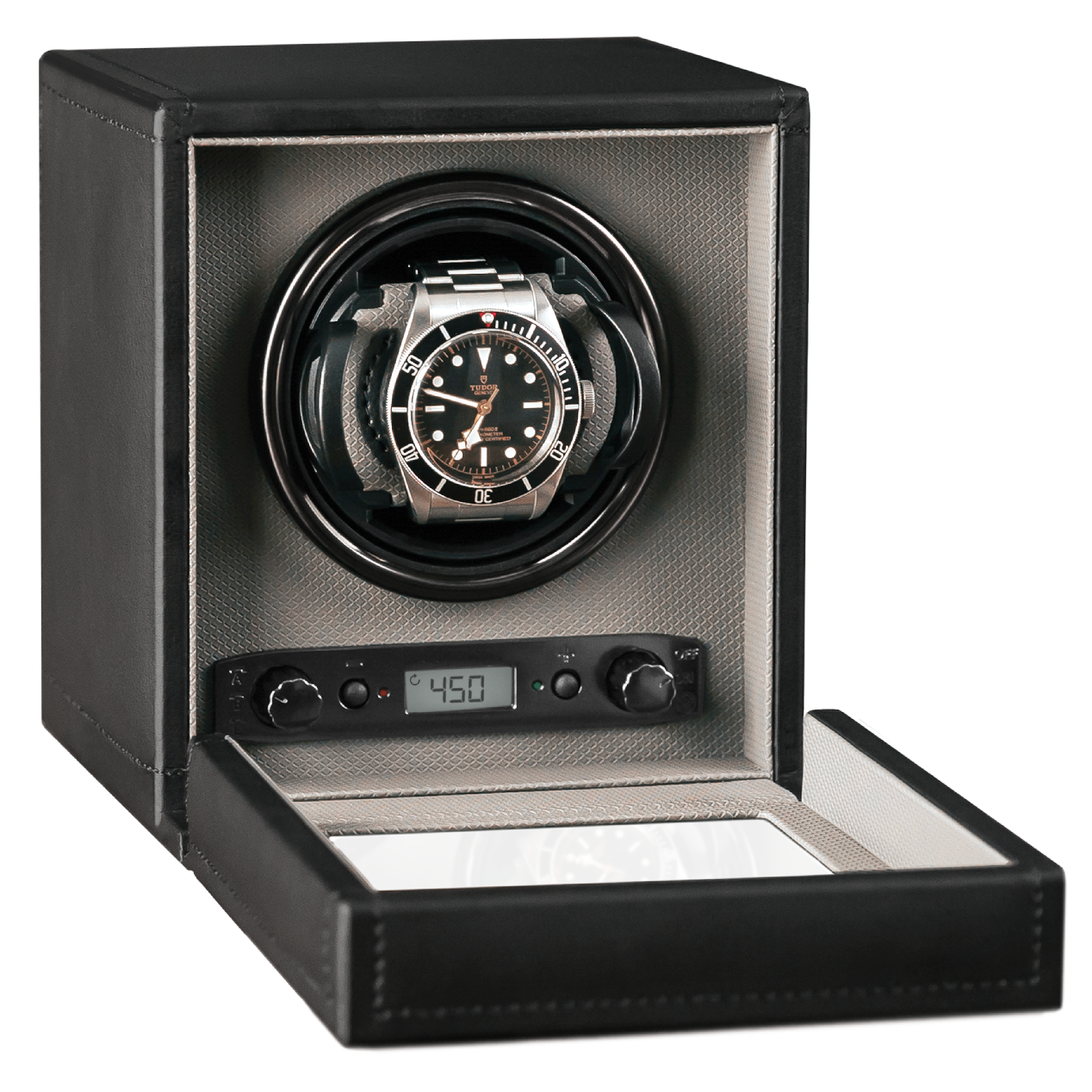- Humidity and physical damage are you two greatest risks when traveling with cigars.
- Flying can be especially rough for cigar humidity and requires some form of protection.
- Humidity fluctuations in geography can be real cigar killers. Have a plan.
- Cigar cases are helpful for short trips, but a travel humidor is needed for substantial travel.
As a smoker, you should know how to safely transport cigars when traveling. Whether heading to a destination wedding or picking up a few imports at a local shop on a business trip, you need to have a system. And it should require more than just throwing them in a ziplock baggie and hoping for the best.
Cigars are delicate things. Without protection from a humidor and exposed to an uncontrolled environment, they’re quickly affected by temperature and humidity changes. And traveling, especially by air, is guaranteed to shake things up. These fluctuations can cause lasting damage — molding or drying and cracking — giving us all the more reason to prepare. We trust our regular humidor at home. But what about when traveling?
You have a few options when it comes to traveling with cigars. Travel humidors and travel cases are tried and true tools. Some aficionados even travel with their desktop humidors. But even then, your cigars, humidor, or travel humidor will all be exposed to a lot of changes. So knowing how to prep for them is just as important as the methodology.
Here’s the list of equipment and knowledge you need to safely travel with cigars.
How Does Travel Affect Cigars?
Whether traveling in a car, ship, or airplane, the primary concern for cigars isn’t so much about the method or the travel itself. It’s about geography.
When you step off an airplane into the jet bridge on your way to the terminal, you can quickly feel the difference in weather — especially if your destination is someplace particularly warm or cool, humid or dry. Hell, you can tell the difference on a long flight: Your nose dries, you’re thirstier, or you wake up with a sore throat the following day.
When we travel, vast changes in geography and environment can have damaging effects on our cigars, especially when humidity is involved.
So whatever cigar travel option you go with, the two problems you’re solving for are the drastic humidity differences you’ll face and the general risk of wear and tear on cigars as you move through airports, transportation, hotels, and wherever else you end up.
What Is A Travel Humidor?
A travel humidor is your best all-around option when traveling. Especially when flying, these keep your cigars protected and as close to home-humidor levels as possible without adding too much bulk to your carry-on situation. Travel humidors are portable by design: durable to prevent physical damage, compact in size so you can pack in checked baggage or a carry-on, and compatible with disposable humidifying elements like humidor packs.
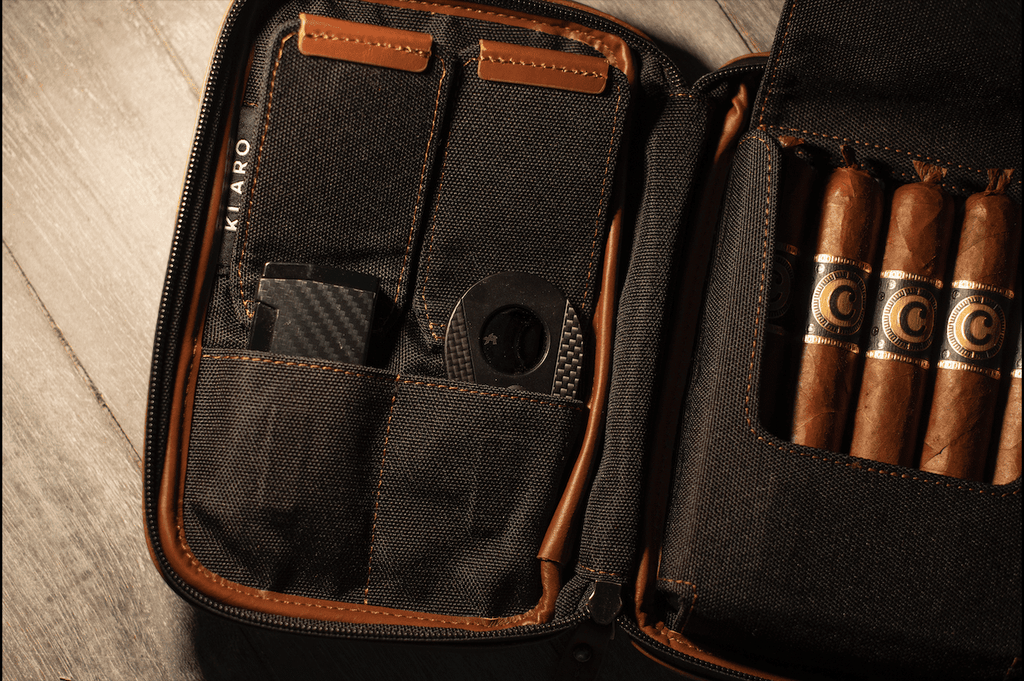
Protection
Most travel humidors are equipped with some form of protective case. The spectrum ranges from lightweight, leather “finger cases” that pack a couple of cigars, to locked-and-loaded, indestructible vault-like cases that are often waterproof and airtight. The bulkier the humidor, the more protection — but that eliminates some of the perks of portability.
Size
The bigger your travel humidor, the more cigars you can pack — generally. The largest travel humidor we’ve seen fits upwards of 80 cigars, but this humidor is in a class of its own. On the larger side, travel humidors typically fit 15-20 cigars, while small cases fit two or three — which is perfectly fine.
An argument for small cases: Smaller, less protective cases only put a couple of cigars at risk. While the bulky, large humidors generally do a great job of protecting a high-dollar collection, misplacing one or having its seal compromised means you might be out a couple hundred dollars in cigars.
Humidifiers
Travel humidors rely on various humidifying elements like humidity packs, pillows, gel beads, and solutions. Heed your cigar-to-humidor-pack ratio recommendations closely. Generally, you’ll want a humidor pack for every twenty cigars. Also remember that these are temporary options: You need to keep some in reserve to replace depending on how long you’re traveling. If you’re not sure? Rule of thumb: Pack extra.
How Does a Travel Humidor Work?
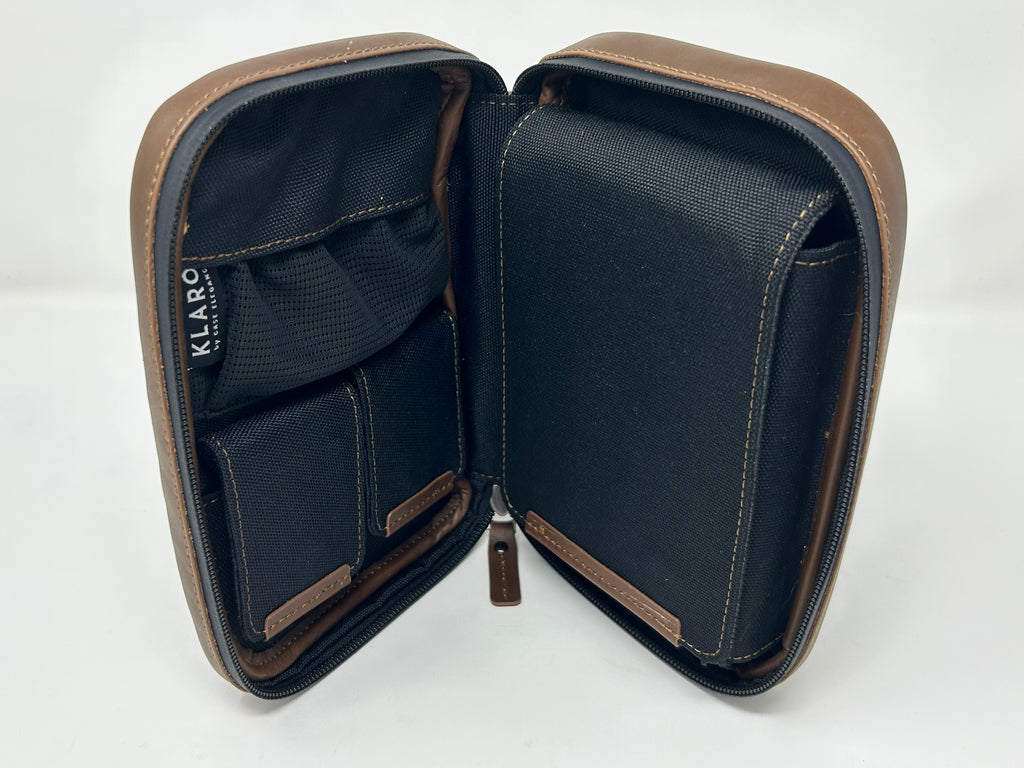
The biggest difference between a standard desktop humidor and a travel humidor is the inside of the case. Larger desktop humidors typically outgun most travel humidors. They’re made of Spanish cedar with either active or substantial passive humidification systems. Travel humidors don’t offer those same luxuries.
Travel humidors are often built with foam padding, like a gun case. Or they use a cradle system to restrain cigars from moving about. Some are equipped with a humidifier in the lid of the case, while others rely on humidor packs. Travel humidors don’t create as ideal of a situation as home humidors, but they can still keep the environment relatively controlled.
Some travel humidors come equipped with built-in hygrometers, but this is less often the case due to size constraints. But monitoring relative humidity levels is crucial to know how well your humidor packs are working. We recommend usings a portable hygrometer — lightweight, compact, fairly reliable — and a lot of travel humidors will have enough space ot fit one.
Another travel humidor DIY tip: Because so few travel humidors use any Spanish cedar element on the inside of the case, consider inserting small cedar planks into your travel humidor to give it an added dimension of humidity control as well as aroma. Throw these into your home humidor a few weeks before your trip, and you should be good to go by the time it’s time to fly.
How To Use a Travel Humidor
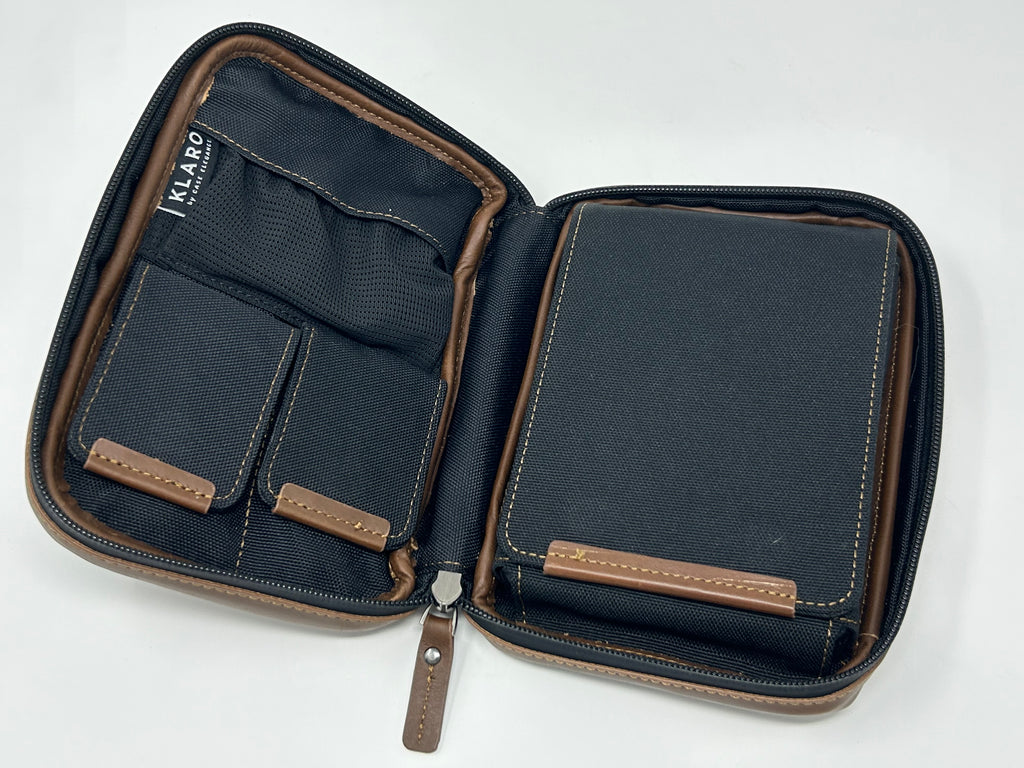
Ensure you don’t overpack your travel humidor. These cases are already working at a disadvantage to keep your stogies at optimal humidity. The last thing you want is to overload the system by jam packing cigars in however they fit. Err on the side of caution and pack fewer cigars than you might need and research a local tobacco shop where you can grab a stick or two you would have otherwise stuffed.
Most travel humidors will require a humidor pack of some kind. Ensure you use a high-quality humidity pack, and buy those at a similar humidity level that you store your cigars in your home humidor.
Go ahead and pack some alternate humidity options to dial in the humidity level further once you arrive at your destination: The humidity levels might be drastically different and, over time, you’ll might need some artillery to stay at your desired range. Don’t shy from bringing several ranges of humidity packs to help you adjust to the perfect level.
Some travel humidors are equipped with a “purge” knob that will allow you to equalize pressure before opening. These are especially helpful when flying. While not always necessary, this will release any suction that occurs from changing altitude.
Where To Buy a Travel Humidor Case
Klaro offers two versions of the Flint Travel Leather Cigar Case, in brown and black leather. Capable of storing up to five cigars, these medium-sized travel humidors are a great option for the weekender trip when you want convenience and class. There’s ample room for your cigars, accessories, and a few extras. Two traits make this case great for traveling: high-quality, full-grain Italian leather, and a hard-shell protective case inside the leather that protects your cigars while on the go.
For short jaunts or quick road trips, check out Klaro’s Premium Three Cigar Travel Cases. While these aren’t equipped with a humidification element, they provide a durable case for up to three cigars, and the inside is lined with Spanish cedar, so you can create a buffer against humidity fluctuations. Fit this in your bag or even in your pocket, and never worry about your cigars getting crushed.
Adjusting Your Humidor To Location
If you’re traveling with a desktop humidor as your cigar armored vehicle, more power to you. Desktop humidors are helpful beyond the household. Because they’re small and relatively lightweight, you can adapt them for travel in a pinch — especially if you’re traveling via car, bus, van, or truck. If you can accommodate the size, just make sure to empty any liquid, for obvious reasons.
Your situation gets more precarious should you choose to pack a humidor in a checked bag, however.
Humidor humidity can fluctuate drastically depending on its surroundings, including geography, seasons, and weather. Whenever you travel and expose your humidor to significantly different relative humidity and temperature, don’t assume your humidor will acclimate without assistance. During this time, monitor the levels of your digital or analog hygrometer closely. You may need add humidor solution to adjust or conversely take steps to lower humidity levels.
Additional Cigar Protection
Remember, you’re solving for two problems when preparing to travel with cigars. First, humidity and temperature fluctuations. Second, general wear-and-tear. Travel humidors and cases help physically protect your cigars, but which cigars you choose to travel with can assist in the protection front, too.
Some cigars arrive from the manufacturer with extra protection — cigar armor, if you will. These can be tubos made of aluminum, cedar, foil, or paper casings, or even glass canisters. Not only are they helpful for extra branding and aesthetic appeal, but these choices can also help protect your cigars from getting squashed, cracked, or worse.
When traveling with cigars, look through your wishlist of cigars and prioritize any that come with a protective casing. Or you can hold onto aluminum cases from previously smoked cigars (being sure to wash them out) and use these for extra protection in your travel humidor or cigar case.
Traveling with Accessories
When you’re traveling with cigars, don’t forget the accessories. But, more importantly, don’t let TSA catch you with a torch lighter and high-end cutter. You won’t get those back.
Instead, pack your accessories in your checked bag, and secure them in a DOT-approved container. Empty your lighter of fuel, and always pack a lighter and cutter you don’t care too much about. Even if you follow all protocols, you don’t have much control over airport security. If lost, these items are easily replaceable at a nearby tobacco or cigar shop. Or, in a pinch, torch one of those cedar planks you packed and use a spill to light up.
With these strategies, you should be well equipped to enjoy multiple choices from your home cigar collection while traveling without damaging or distorting the tobacco.


